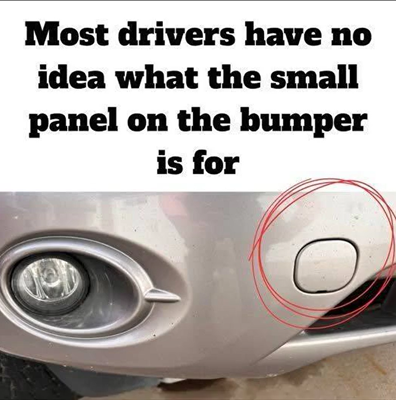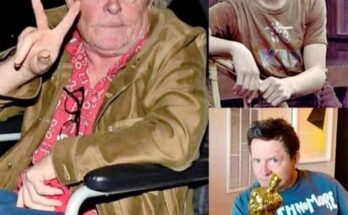
If you’ve ever walked around your car and noticed a small square or rectangular panel on the front or rear bumper, you might have assumed it was simply a design feature, a cosmetic detail meant to keep the lines of your vehicle smooth and sleek.
In reality, that tiny, almost inconspicuous cover hides one of the most important safety and utility features on your car:
the tow hook socket. This small, often overlooked detail can make a huge difference in a roadside emergency, ensuring that your vehicle can be safely and securely towed if it breaks down, gets stuck, or needs to be moved.
The tow hook socket is a threaded metal insert built directly into the car’s frame behind that little bumper panel.
Its primary function is to provide a manufacturer-approved, secure attachment point for towing.
Without a designated socket like this, drivers might be tempted to attach a rope, strap, or chain to other parts of the car, such as the bumper, suspension, or chassis components.
Doing so can easily cause structural damage or cosmetic issues, potentially leading to costly repairs.
By designing a strong, threaded socket for towing, car manufacturers ensure that even if your vehicle needs assistance, it can be moved safely without damaging sensitive parts.
To protect the socket and maintain the aesthetics of the vehicle, automakers cover it with a removable panel.
This cover is typically color-matched to your car and sits flush with the rest of the bumper, preserving the sleek appearance of the vehicle while keeping the socket protected from dirt, moisture, and corrosion.
The panel is engineered to be easy to remove when needed, yet secure enough that it doesn’t fall off during everyday driving.
Where the tow hook is stored
Most vehicles include a tow hook in the trunk or cargo area, often stored near the spare tire or in the roadside assistance tool kit.
The hook itself is usually a simple, sturdy metal piece with a threaded end designed to screw securely into the bumper socket.
While it may appear small and insignificant, this hook is engineered to withstand significant tension and load, making it the safest point for towing.
Many modern cars feature tow hook sockets on both the front and rear bumpers, giving drivers flexibility depending on the situation.
Some smaller vehicles or certain performance-oriented models may have only a rear or front socket, so it’s essential to familiarize yourself with your car’s setup.
Knowing where the tow hook is and how to use it ahead of time can save you stress in an emergency.
How to use a tow hook properly
Using a tow hook may seem straightforward, but there are a few key steps and precautions to keep in mind:
- Locate and remove the cover: The small square or rectangular panel conceals the socket. Gently pry it off using a flat tool or your fingers if possible.
- Screw in the tow hook: Take the metal hook from your vehicle’s tool kit and thread it carefully into the socket.
- Turn it clockwise until it is snug and firmly seated. Avoid overtightening, as this could damage the threads or make it difficult to remove later.
- Attach the tow line: Use a tow rope, chain, or tow bar to connect to the hook. Always follow proper towing techniques and manufacturer guidelines to prevent accidents.
- Drive carefully: If your car is being towed, the towing vehicle should start slowly, avoid sudden stops or sharp turns, and maintain a steady, controlled speed.
By following these steps, you ensure that towing is done safely, protecting both your vehicle and the tow vehicle.
The tow hook is particularly important for front-wheel-drive cars when being towed from the rear, or vice versa, depending on the manufacturer’s recommendations.
Why tow hooks are essential
Tow hooks are more than just convenient accessories; they are a vital safety feature.
Attempting to tow a car by looping a rope around a bumper, axle, or suspension component can lead to serious damage.
Bumpers can crack, metal components can bend, and delicate electronics or sensors can be compromised.
The tow hook eliminates these risks by providing a purpose-built, reinforced connection point that is designed to handle the forces of towing.
In addition, tow hooks are critical for off-road vehicles. When navigating difficult terrain—mud, sand, snow, or rocky trails—vehicles often get stuck and need to be pulled free.
Off-road enthusiasts know that the built-in tow hook socket is much stronger and safer than attaching recovery straps to random parts of the vehicle.
Some off-road vehicles even come with reinforced hooks or D-ring mounts to handle higher loads.
Extra tips for maintaining and using tow hooks
- Check the owner’s manual: Every car model is slightly different. The manual will show the exact location of front and rear sockets, storage of the tow hook, and recommended towing practices.
- Keep the cover in place: The panel protects the socket from rust, debris, and accidental damage. Only remove it when necessary.
- Inspect the hook periodically: Make sure the tow hook is free from rust or damage. A compromised hook may fail under tension.
- Know the limits: Tow hooks are designed for pulling your vehicle over short distances or for towing at low speeds. They are not intended for high-speed highway towing unless using a proper tow bar or flatbed setup.
The history and evolution of the tow hook
Tow hooks have been used in vehicles for decades, evolving alongside automotive safety standards.
Early vehicles often had exposed metal loops or hooks welded to the frame, but these were prone to rust and not always in convenient locations.
Modern vehicles, in contrast, hide the sockets behind removable panels for aesthetics while still providing a strong, reinforced point for towing.
Manufacturers also design these sockets to accommodate standardized towing equipment, so emergency roadside services can easily attach tow cables or hooks without damaging the car.
Some high-end or sports cars even include threaded sockets designed specifically for flatbed transport, making vehicle shipping safer and more efficient.
Real-life examples of tow hook use
Imagine driving on a rainy night when your car gets stuck in mud at the edge of a rural road.
With a properly installed tow hook, a passing motorist or tow truck can quickly attach a cable and safely pull your vehicle out without damaging your bumper or frame.
In winter conditions, when snow and ice can trap cars in parking lots or driveways, the tow hook allows for a secure attachment point to move your vehicle safely.
Even minor roadside mishaps, such as accidentally sliding into a ditch or getting caught on a steep incline, become easier to handle with this small but vital feature.
A small detail with a big impact
It’s remarkable how much engineering goes into seemingly minor features like the tow hook socket.
That small square or rectangular panel on your bumper may go unnoticed for years, yet it conceals a feature that can prevent damage, save money, and ensure safety in emergencies.
Modern vehicles are designed with countless small details like this, balancing functionality, safety, and aesthetic appeal.
The next time you inspect your car, take a closer look at that little panel. Remember that behind it lies a thoughtfully designed tool, ready to protect your car and make towing as safe and simple as possible.
Understanding and using it correctly is not only a smart move—it’s a small step that could make a significant difference when you need roadside assistance or are navigating challenging conditions.
In the end, the tow hook socket is a perfect example of automotive design that prioritizes practicality and safety, proving that even the tiniest details on your car can have an outsized impact on real-world driving experiences.


